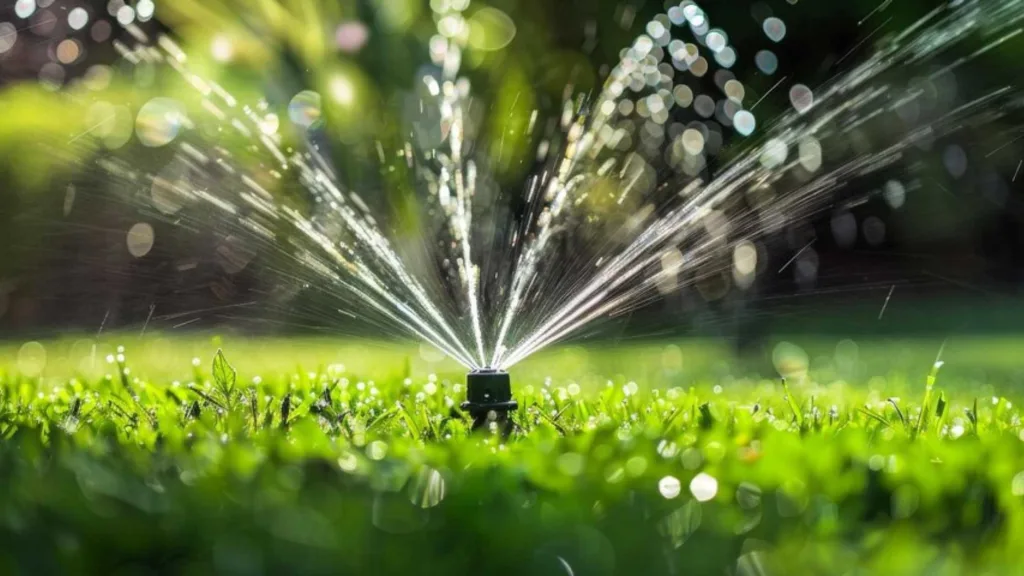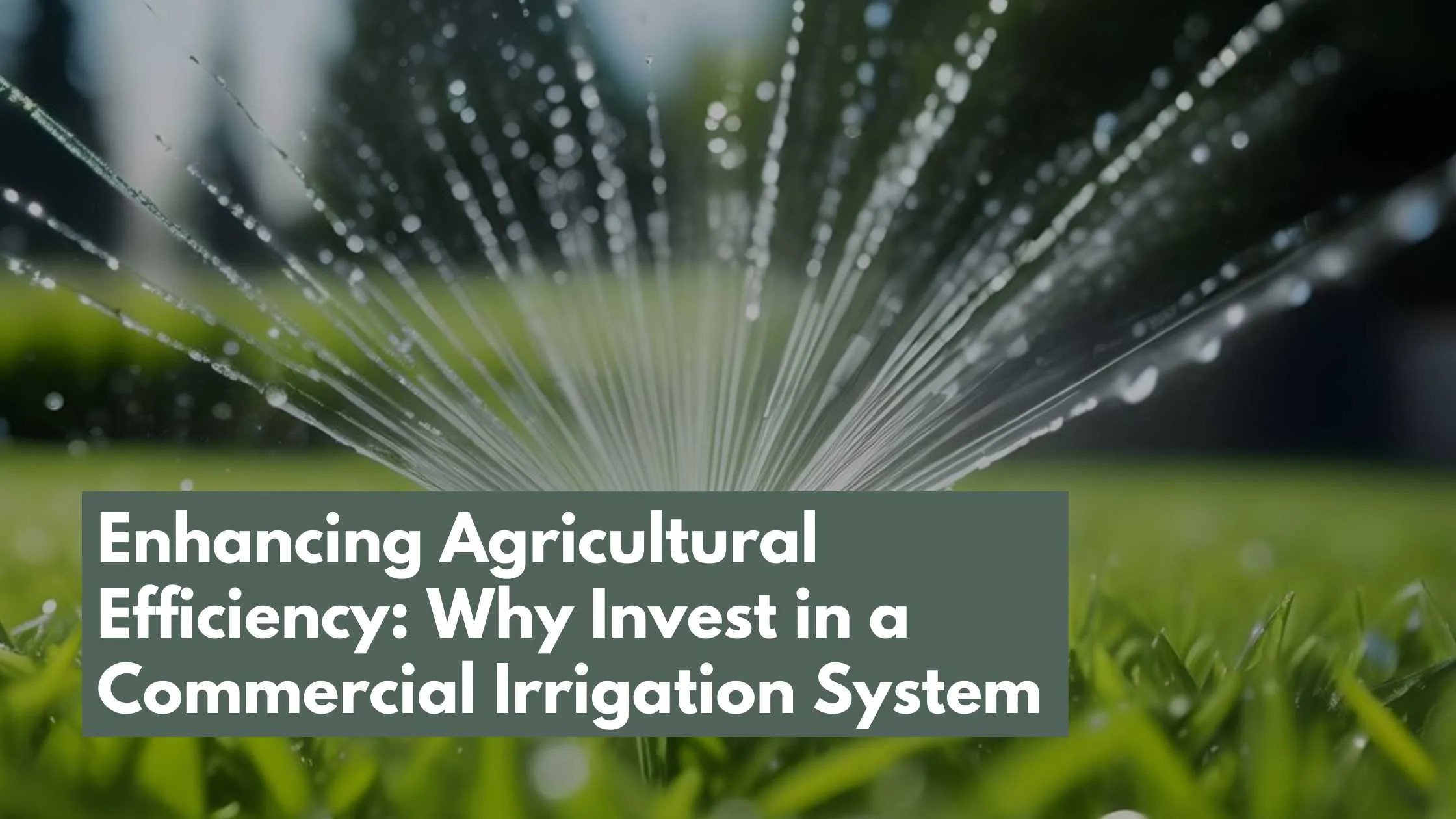In today’s expansive field of agriculture, efficiency is critical. Sustainable agricultural approaches require, not only aim for, the maximization of production while preserving resources. Of all the instruments at one’s disposal to accomplish this, one sticks out: the commercial irrigation system.
In this thorough investigation, we explore the several factors that make purchasing a commercial irrigation system not only wise but also necessary for agricultural businesses hoping to succeed in the cutthroat market of today.
What is a Commercial Irrigation System?
An intricate network of tools and technology called a commercial irrigation system is used to effectively distribute water to commercial landscapes, agricultural fields, and other sizable outdoor spaces. Commercial irrigation systems, in contrast to conventional manual watering techniques, automate the processes of distributing water, maximizing resource utilization, and encouraging robust plant development.

Pumps, pipelines, valves, controllers, sprinklers, and drip emitters are common parts of these systems. To precisely manage water, they could also include cutting-edge technologies like weather monitoring stations, soil moisture sensors, and remote control capabilities.
Commercial irrigation systems are designed to meet the unique requirements of the location, accounting for elements including crop requirements, topography, soil type, and climate. Through direct water delivery to the plant’s root zone and reduced water loss due to evaporation or runoff, these systems optimize water efficiency and foster environmentally friendly farming methods.
In general, commercial irrigation systems are essential for increasing crop yields, preserving water supplies, and guaranteeing the long-term sustainability of commercial landscapes and agricultural activities.
Why Invest in a Commercial Irrigation System
Let’s delve into the benefits of investing in a commercial irrigation system:
The Water-Energy Nexus: Efficient Resource Allocation
Energy and water are essential to agriculture. The interaction of these resources is essential to maximizing yields and reducing environmental damage. By carefully controlling water distribution, commercial irrigation systems provide an advanced solution that saves energy and water.
Modern irrigation technology, including pivot systems or drip irrigation, can help farms reduce water loss from runoff or evaporation. Furthermore, sophisticated systems incorporate sensors and data analytics to optimize watering schedules according to crop requirements, weather predictions, and soil moisture levels. This degree of accuracy not only saves water but also lowers the energy needed to pump and distribute water throughout fields.
Maximizing Crop Yields: Precision Agriculture at its Finest
Precision is essential in the pursuit of increased production. Farmers can provide ideal growing conditions for their crops by directly supplying water and nutrients to the root zone through the use of commercial irrigation systems. This focused strategy encourages stronger, healthier plants with more robust root systems, which raises yields and enhances crop quality.
Furthermore, the capacity to modify irrigation schedules in response to real-time data enables farmers to react quickly to evolving environmental circumstances. Modern irrigation systems offer the flexibility required to reduce hazards and protect crop health, regardless of the weather—droughts, heat waves, or heavy rainfall, for example.
Sustainable Water Management: Mitigating Environmental Impact
Sustainable water management is now required rather than optional in an era characterized by climate change and water constraints. In this sense, commercial irrigation systems are essential since they maximize environmental preservation while encouraging the effective use of water resources.
Conventional flood irrigation techniques frequently cause water runoff, nutrient leaching, and soil erosion, which contaminates water sources and destroys ecosystems. Modern irrigation methods, on the other hand, minimize soil disturbance and runoff while precisely delivering water where it’s required, reducing these negative effects.
Commercial irrigation systems also help to reduce greenhouse gas emissions linked to agricultural activities by saving energy and water. The correlation observed between agricultural productivity and environmental stewardship highlights the importance of allocating resources towards sustainable irrigation techniques.
Economic Viability: Long-Term Returns on Investment
Installing a commercial irrigation system may appear expensive at first, but the long-term advantages significantly outweigh the expenditures. Irrigation projects provide farmers and agribusinesses with a strong return on investment (ROI) by increasing crop yields, lowering input costs, and increasing land value.
Increased revenue potential from higher yields gives agricultural businesses a consistent flow of cash. Irrigation systems also assist reduce operating costs over time by using less energy and water, which raises overall profitability.
Moreover, the capacity to provide superior crops continuously boosts market competitiveness and enables farmers to demand higher prices for their supply. Whether serving regional markets or taking part in international supply chains, irrigation infrastructure investment increases agricultural enterprises’ ability to withstand changes in the volatile agricultural industry.
Regulatory Compliance: Meeting Water Use Regulations
Regulations about the use of water are getting stricter in many areas as officials work to reconcile conflicting demands for scarce water supplies. Commercial irrigation systems provide a way to maximize water use efficiency and guarantee compliance with these laws.
Farmers may show their support for sustainable water management and stay out of trouble with the law by implementing effective irrigation techniques. Investing in contemporary irrigation systems also enhances agricultural businesses’ credibility and reputation in the community by positioning them as good environmental stewards.
Challenges Associated with Commercial Irrigation System
- Initial Cost: The creation of infrastructure, labor expenditures, and equipment purchases can all add up to substantial upfront costs when installing a commercial irrigation system.
- Complexity of Design: Careful planning is needed to take into consideration variables like crop choices, soil type, field layout, and the availability of water sources when designing an irrigation system that will work for large-scale commercial operations.
- Maintenance Requirements: To guarantee the correct operation of commercial irrigation systems, routine maintenance is necessary. Problems like blocked filters, broken pipelines, and broken valves can cause problems with water distribution and jeopardize the health of the crops.
- Concerns about Water Quality: High salinity, alkalinity, or pollutant levels in water can negatively impact crop growth and system components. For irrigation, treating water might be required to lessen these difficulties.
- Energy Consumption: Energy is needed to pump water through irrigation systems, which raises operating expenses and has an adverse effect on the environment. These difficulties can be lessened by investigating alternate energy sources and improving pump efficiency.
- Risk of Overwatering or Underwatering: Inadequate irrigation techniques can result in either overwatering, which can cause nutrient leaching and waterlogging, or underwatering, which can cause drought stress and lower yields. Monitoring systems and precision irrigation technologies can help reduce these dangers.
- Weather Variability: Irrigation management may face difficulties due to variations in weather patterns, such as heat waves, droughts, or excessive rainfall. Adaptive irrigation techniques and flexible scheduling are necessary to react to shifting environmental circumstances.
- Regulatory Compliance: Commercial irrigators may face difficulties adhering to water use permits and regulations, especially in areas where there are conflicting demands for water. Sustainable irrigation strategies entail maximizing water use efficiency while adhering to regulatory criteria.
- Labor Intensity: Monitoring system performance, modifying settings, and performing repairs and maintenance can all involve substantial labor input in the operation and management of a commercial irrigation system.
- Technological breakthroughs: Agricultural enterprises face difficulty in keeping up with the quickly emerging irrigation technology and innovations. To effectively harness the latest breakthroughs, they must invest in continual education, training, and support.
Conclusion: A Prudent Investment for Agricultural Success
In conclusion, for agricultural businesses looking to prosper in the ever-changing agricultural scene of today, investing in a commercial irrigation system is not just a question of preference but also a strategic need. The advantages of irrigation expenditures are numerous and extensive, ranging from energy and water conservation to increasing crop yields and guaranteeing regulatory compliance.
Farmers and agribusinesses can achieve unprecedented levels of production, profitability, and efficiency by embracing innovation and implementing sustainable irrigation practices. It is impossible to overestimate the impact that commercial irrigation systems will have on agriculture’s future as we tackle the problems posed by a rapidly changing climate and an expanding global population.
Essentially, funding irrigation infrastructure ensures food security, environmental sustainability, and economic resilience for years to come. It also represents a commitment to future generations‘ prosperity.




Reading about commercial irrigation systems has me feeling optimistic about the future of sustainable agriculture.
Why invest in a commercial irrigation system? Because it’s an investment in the future of farming and food security.
Why invest in a commercial irrigation system? Because it’s a win-win for both farmers and the environment.
Commercial irrigation systems seem like the way of the future – it’s great to see technology improving farming practices.
Challenges associated with commercial irrigation systems are just opportunities for innovation and improvement.
Investing in a commercial irrigation system is like giving your crops a drink of water on demand – can’t beat that convenience!
Learning about commercial irrigation systems reminds me of the importance of efficient water management in agriculture.
Challenges associated with commercial irrigation systems? Bring it on – farmers are pros at overcoming obstacles!
What is a commercial irrigation system? Sounds like something every farmer should have to optimize their water usage!
Reading about the benefits of commercial irrigation systems makes me excited for the future of farming.
Investing in a commercial irrigation system seems like a smart move – saving water and boosting crop yields at the same time.
Commercial irrigation systems sound like a game-changer for farmers
Can you be more specific about the content of your article? After reading it, I still have some doubts. Hope you can help me.
Yes ask me your doubts I am here to help.